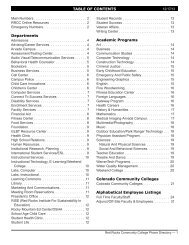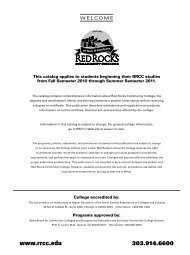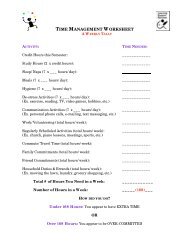opportunities, options, excellence - Red Rocks Community College
opportunities, options, excellence - Red Rocks Community College
opportunities, options, excellence - Red Rocks Community College
Create successful ePaper yourself
Turn your PDF publications into a flip-book with our unique Google optimized e-Paper software.
EIC 227 Mechanical Drives<br />
1.5 Credits<br />
This course covers the basics of mechanical<br />
drives including chain drives, belt drives,<br />
bushings, couplings, gear drives, bearings,<br />
and lubrication. Topics include power transmission<br />
physics, shafts, keyways and keyseats,<br />
prime movers, gearing, chain drives,<br />
belt drives bushings couplings, bearings,<br />
lubrication, clutches, brakes and torque limiters,<br />
mechanical variable speed drives.<br />
EIC 229 AC and DC Variable Speed<br />
Drive Technology<br />
1.5 Credits<br />
This course teaches you about Variable speed<br />
drive technology. This offers a cost effective<br />
method to match driver speed to load<br />
demands. Drive technology presents an<br />
opportunity to reduce operating costs and<br />
improve overall productivity. In this course<br />
you will learn the ins and outs of variable<br />
speed drive technology, including: Operation,<br />
Set-up, Troubleshooting, Maintenance, roper<br />
selection and application for drives and basic<br />
drive overview and comparison.<br />
EIC 231 Electro-Pneumatics<br />
Training<br />
1.5 Credits<br />
This powerful interactive training program<br />
will introduce you to the real world of pneumatic<br />
and electro-pneumatic control and<br />
power transmission. You will learn the full<br />
scope of compressed air production, preparation,<br />
and distribution. Through “Hand-On”<br />
learning, you will learn to apply simple gas<br />
laws, reading of symbols and understanding<br />
of component technologies.<br />
EIC 233 AC/DC Machines:<br />
Theory and Applications<br />
1.5 Credits<br />
This course is presented using the lates technological<br />
equipment. Instruction techniques<br />
include demonstrations with participant interaction,<br />
as well as “Hands’-On” lab exercises.<br />
All phases of this course are taught in simple<br />
and easy-to-understand terms. The content<br />
progresses logically from basic operational<br />
theory to the actual operation of various types<br />
of AC and DC motors.<br />
EIC 234 High Voltage Electrical<br />
Safety<br />
1 Credit<br />
This course teaches your responsibilities<br />
according to OSHA 29 CFR 1910.269. All<br />
qualified employees performing operations or<br />
maintenance work or who have access to<br />
power generation, transmission and distribution<br />
installations must be trained according to<br />
OSHA standards. The standard covers the following<br />
types of work operations:Inspection,<br />
Switching-Connection and Disconnections,<br />
Maintenance of Lines, Equipment Testing,<br />
Fault Locating, and Streetlight Relamping.<br />
EIC 235 Transformers and Power<br />
Distribution<br />
4 Credits<br />
Prerequisite:EIC 155 or permission of<br />
instructor<br />
This course studies the theory of operating<br />
power and instrument transformers; modem<br />
methods of delivering electrical energy from<br />
point of generation to point of use. Single and<br />
polyphase, circuit connections, voltage regulation<br />
and short circuit calculations are verified<br />
in the laboratory. This course stresses<br />
safety, National Electrical Code requirements;<br />
installation and maintenance considerations.<br />
EIC 240 Fire Alarm Fundamentals<br />
4 Credits<br />
This course covers terminology, symbols, diagrams,<br />
devices, circuits and wiring, and basic<br />
layouts and principles involved in fire alarm<br />
system design and construction.<br />
EIC 241 Advanced Fire Alarm<br />
Systems<br />
4 Credits<br />
Prerequisite: EIC 240<br />
This course covers design, installation, documentation,<br />
testing and codes. Advanced layout<br />
and principles involved in fire alarm system<br />
design and construction are covered.<br />
Students testing for NICET II certification<br />
can benefit from this class.<br />
EIC 242 National Fire Alarm Code<br />
4 Credits<br />
Prerequisite: EIC 240<br />
The National Fire Alarm Code and local code<br />
requirements for fire alarm system installation<br />
are taught in this course.<br />
EIC 250 Fiber Optics Training<br />
1.5 Credits<br />
This course on the introduction and theory of<br />
fiber optics includes standards, installation,<br />
connectorization, mechanical/fusion splicing,<br />
and testing through advanced procedures in<br />
troubleshooting, repair, and certification.<br />
Many variations of equipment and materials<br />
make this a certification course for levels 1, 2,<br />
and 3 that is not dependent on a specific vendor.<br />
Building real world fiber networks with<br />
extensive hands on certification and written<br />
exams prepare students for the versatility of<br />
actual work environments.<br />
EIC 251 Fiber Optics Training<br />
Advanced<br />
4 Credits<br />
This course on the introduction and theory of<br />
fiber optics includes standards, installation,<br />
connectorization, mechanical/fusion splicing,<br />
and testing through advanced procedures in<br />
troubleshooting, repair, and certification.<br />
Many variations of equipment and materials<br />
make this a certification that is not dependent<br />
on a specific vendor. Many variations of<br />
equipment and materials make this a certification<br />
course for levels 1, 2, and 3 that is not<br />
dependent on a specific vendor. Building real<br />
world fiber networks with extensive hands on<br />
certification and written exams perpare students<br />
for the versatility of actual work environments.<br />
EIC 254 Telephony<br />
1.5 Credits<br />
This course is designed for individuals new to<br />
the telecommunications industry or in positions<br />
requiring a basic knowledge of voice<br />
and data communications systems, networks<br />
and terminology; or those who need to understand<br />
current networking alternatives and the<br />
impact on business decisions and <strong>opportunities</strong>.<br />
EIC 279 Comprehensive Structured<br />
Cabling<br />
3 Credits<br />
Special course fees<br />
This course combines the Fiber Optics<br />
Certification and Structured Cabling<br />
Certification classes into a comprehensive<br />
study of cabling systems in one course.<br />
EIC 280 Fiber Optics Certification<br />
2 Credits<br />
Special course fees<br />
This course on the introduction and theory of<br />
fiber optics includes standards, installation,<br />
connectorization, mechanical/fusion splicing<br />
and testing through advanced procedures in<br />
troubleshooting, repair and certification.<br />
Many variations of equipment and materials<br />
make this a certification course for levels 1,2<br />
and 3 that is not dependent on a specific vendor.<br />
Building real-world fiber networks with<br />
extensive hands-on certification and written<br />
exams prepare students for the versatility of<br />
actual work environments.<br />
EIC 281 Electrical Issues for<br />
Telecommunications<br />
0.5 Credit<br />
Special course fees<br />
135 2002 - 2003 <strong>Red</strong> <strong>Rocks</strong> <strong>Community</strong> <strong>College</strong> Catalog
















